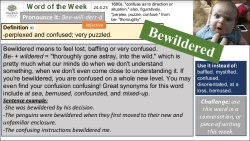Inspiring A level Art Lesson
It was a real privilege to visit Miss Cole and her A level Year 12 Art class on Monday of this week and see such inspiring work being undertaken and completed. Amazing progress...
Filter by Category
Filter by Author


























































































































































































It was a real privilege to visit Miss Cole and her A level Year 12 Art class on Monday of this week and see such inspiring work being undertaken and completed. Amazing progress...
Posted by Jeremy Turner

Thousands of people are dying, And the world sits back, crying, The world leaders get up, this has to stop, Tottenham’s trophy cabinet dust is flying. Arsenal fans are...
Posted by Anthony Carter

How to feel more confident about exams What are negative beliefs? Many people with high exam anxiety can’t stop worrying about failing or the consequences of failing. For...
Posted by Mo Abusef

On Thursday 2nd February, a group of around 40 maths students from year 11, 12 and 13 went on an exciting trip to the Formula One Racetrack, Silverstone. On our arrival, we were...
Posted by Lara Timmins
Our ‘Time2Sh9e’ group of year 11s are our top students in the year – those that all indications suggest should be achieving the very top grades in some subjects. Over the...
Posted by Stephanie Knowles

It’s the time of year when the key focus us on revision. Teachers of Year 11 and 13 are coming up with innovative ways to help the students revise and support them through the...
Posted by Tracy Greenwood

Posted by Danielle Bowe

Year 8A Boys v St Michaels Mr Harris Date: Friday 21st April 2023 Result: Won 5 – 4 on penalties (3 – 3 end of normal...
Posted by Ashley Cartledge

On Friday 21st April, over 90 year 7 students descended upon Mountfitchet Castle in Stansted Mountfitchet, Essex. This reconstruction of a Motte and Bailey Castle tied in...
Posted by James Burley

We all like to share our experiences when taking exams and sharing ideas with others online can be helpful when you’re studying or revising. However, it is important to consider...
Posted by Mo Abusef
Many people with high exam anxiety can’t stop worrying about failing or the consequences of failing. For instance, ‘If I fail my GCSEs my whole life will be a failure’. These types of beliefs focus on what you can’t do rather than what you can.

Find a positive, realistic belief that can replace the negative belief. For instance, if your negative belief is ‘I am rubbish at maths’ a positive, realistic alternative could be: ‘Even if I will never be the best at maths, I will do better if I have a revision plan and stick to it’.
The key things to remember are that:

For many students, starting revision is the biggest hurdle to overcome.
One of the most effective ways to build confidence about taking exams, overcome any nervousness about starting revision, and manage any worry about taking exams, is to structure revision.
A good way to manage this is to:
Create a plan: break down everything you need to revise into small topics and just revise one topic at a time. By creating a plan you are taking control
Set targets: identify when you are going to revise each topic. Give yourself a time limit for when to complete each topic
Check progress: check your progress and set yourself a new time limit if necessary. Once you’ve met a target, set yourself a new one
A way you can approach revision of a specific topic is to structure it in 4 stages. Stage 1 is to set a specific target for what you want to revise and when. Make it manageable and don’t try to do too much. Stage 2 is to revise the topic you specified at the time you planned to revise it. Stage 3 is then to test your revision. This could be immediately after your revision, later in the day, or the next day. You could test yourself by simply practising an exam question. Stage 4 is to review your target. If you met it, then set yourself a new target (Stage 1) and start the cycle of revision again.
It will be important to look at the same topic more than once to make sure your comprehension is good. If you struggle with the topic a second time, try to work out why that is. Were you distracted and finding it difficult to concentrate or have you identified part of a topic you don’t quite understand as well?
Of course these are suggestions for ways to practise revision and there are certainly other ways, so if you have found a good way that works for you, stick with it. The thing to take from this is that planning ahead can help to manage any concerns you might have about revising.
The key things to remember are that:
People react to stress in different ways. Stress can be a great motivator for some students, giving them the ‘get up and go’ that they need to succeed. Other students are indifferent to stress; they can float along without getting affected by stress in a good or bad way. Stress can be a bad thing for some students, when exam pressures become overwhelming.
The key things to remember are that:

The key things to remember are that:

When you become anxious your breathing becomes shallow and fast. Breathing slowly and deeply will help you calm down and feel in control.
The key things to remember are that:

Food Practical Exam – Monday 2nd July periods 1-3 Art exam – Tuesday 3rd July Regulations All students should attend normal lessons when not in an exam Exams...

Friday afternoon’s Pre Public Examination (PPE) Results Assembly was one of those moments when our hardworking Year 11 students had an opportunity to stop and think and...